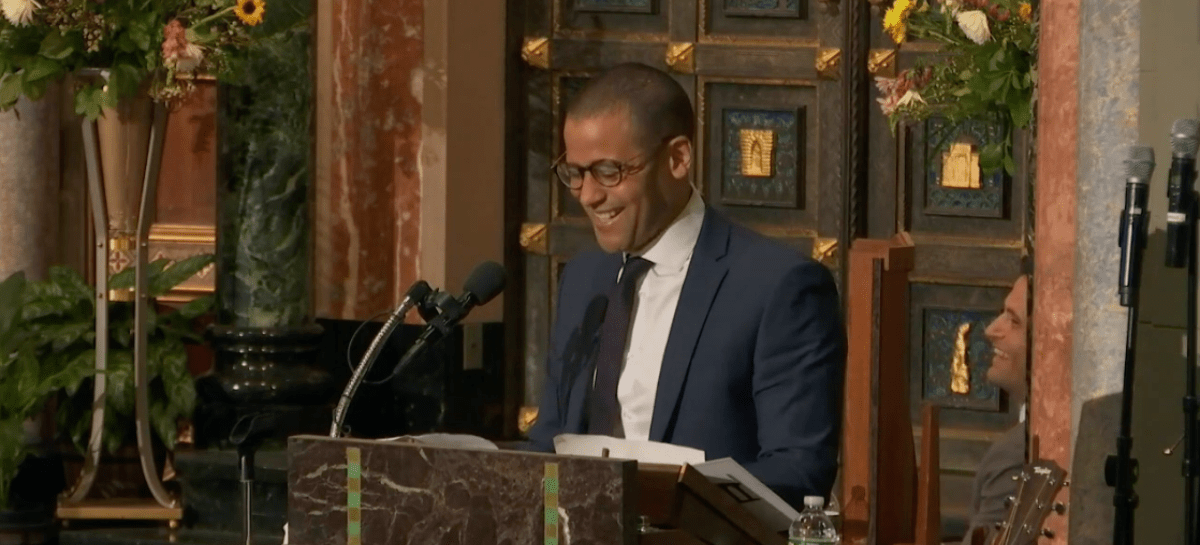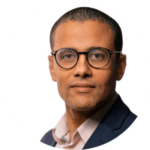
On May 23, 2024, Jacob Mchangama delivered the commencement speech at The Birch Wathen Lenox School in New York, NY. Watch the speech above or read it below:
Speech Transcript
Good morning, esteemed faculty, proud parents, and graduates of the class of 2024.
Now I know what some of you might be thinking. “Really? We JUST graduated, and then they asked some random European guy to lecture us about free speech?”
If this were a TikTok, you would have already swiped to the next video.
“OK Boomer, you’re not even on TikTok” I hear you say. And that’s true. So before I cringe out this place, allow me to get serious.
Since you’re here today, I assume all of you have passed civics. But don’t worry, I’m not going to quiz you on the writings of old philosophers, the speeches of America’s founding fathers, or Supreme Court cases. But I do want to convince you that free speech is the MOST IMPORTANT of rights and that its survival is more decisive for your future than you think.
Have you ever thought about how different your life would be without the freedom to learn what you want? Probably not, and why would you? You live in an open democracy, with strong First Amendment freedoms that protect your right to think and speak as you wish.
But your enjoyment of these freedoms makes you part of a tiny minority of human beings throughout global history. Even here in America, free speech was long denied to unpopular minorities.
To get a sense of what life without freedom of thought and speech would feel like, I want you to think back to pre-emancipation America. Imagine that you are a curious and thoughtful person, but instead of living on the Upper East Side, you were born into slavery in the South.
When the wife of your slave master teaches you how to read, her husband becomes furious because “If you teach him how to read, he’ll want to know how to write; and, this accomplished, he’ll be running away.”
Having had a first taste of humanity, you are immediately deprived of your thirst for knowledge.
For one young boy, this exact scenario became a pivotal moment in his life. He realized that knowledge was the key to his freedom, both in mind and body.
Despite constant danger, he befriended local white children, exchanging bread for reading lessons. He studied in secret, using whatever old books and newspapers he could find. He carried around a Webster spelling book. Each word he learned became a step toward liberation. A journey of empowerment. “Once you learn to read, you will forever be free,” he later proclaimed.
Can any of you guess who I’m talking about?
That boy was none other than Frederick Douglass. His quest for knowledge transformed him into a leading abolitionist and an eloquent orator whose words delivered devastating blows to slavery.
But Douglass’s experience didn’t just teach him about the importance of education. He realized that slavery was built on the denial of the right to think and speak freely. And so he understood that “the right of speech is a very precious one, especially to the oppressed.”
Okay, so I’m sure you are all sending Snaps to your friends right now: He told us he wasn’t going to talk about old historical guys. What the heck does Douglass’ life have to do with us?
Here’s the thing: if there’s one lesson, I want you to take away from today, it’s not to take free speech for granted.
Frederick Douglass had to literally search for scraps to read and learn at the risk of being whipped or sold. You, on the other hand, were not only born in freedom, you have all the information and knowledge in the world available on the phones in your pockets. It’s easy to take it for granted. But this privileged position shouldn’t make you lose sight of how rare and valuable the freedom to enjoy that knowledge is.
Globally a free speech recession is threatening the future of freedom. Even today, girls in Afghanistan are banned from education under the Taliban. And right here in the US, there are politicians who want to censor school libraries and decide what college professors can teach when it comes to “divisive issues”.
Unfortunately, this is happening at a time when the civic commitment to free speech is in decline.
Many students only a few years older than you entered college unequipped with Frederick Douglass’ appreciation of how empowering it is to combine knowledge and free speech. Instead, some of your predecessors have embraced the view that free speech is a threat to equality and should only be used by the righteous. As such, they believe they are entitled – or even required – to deny free speech to others. 45% of college students think blocking other students from attending a speech is acceptable. More than a quarter of students think that using violence to stop a campus speech is A-OK.
We are seeing this play out right now with protests over the war in Gaza. In some cases, peaceful campus protests have served as examples of what the First Amendment is all about. And some protests have been met with overzealous and unconstitutional responses from politicians and the police.
But in other cases, we have seen protests devolve into intimidation, harassment, and even instances of violence.
Some students believe that their cause against injustice – real or imagined – grants them the moral high ground to disrupt academic pursuits, shout down speakers they disagree with, occupy buildings, or deny press access to their “liberated zones.” But this is a distorted and twisted version of free speech.
When Frederick Douglass gathered with fellow abolitionists in Boston in 1860, they were greeted by a mob that shut down the meeting. That episode prompted Douglass to deliver his famous “A Plea for Free Speech in Boston” where he said, “There can be no right of speech where any man . . . is overawed by force, and compelled to suppress his honest sentiment.”
It might be tempting, in the heat of passion and the certainty of our beliefs, to drown out opposing voices, especially ideas that might offend or upset various groups. And counterprotests are a legitimate and important form of expression. But they should not cross the line into the Heckler’s Veto, intimidation, or violence that deny to others the rights that you insist on exercising yourself.
As Douglass said, “To suppress free speech is a double wrong. It violates the rights of the hearer as well as those of the speaker.”
Students willing to disrupt but unwilling to listen fail to grasp a crucial life hack. When you shut down a speaker who you may disagree with on 90% of the issues, you lose the opportunity to find common ground or learn about the other 10%. You might encounter ideas that you haven’t considered, and even if you can’t persuade or be persuaded, you might learn more about your own biases and preconceived notions about the world.
But what we are seeing play out in too many places in America today is not a healthy culture of free speech.
As Frederick Douglass taught us, free speech and equality are friends, not enemies. Speech in response to hate or offensive speech can be a much more powerful weapon than enforced silence.
Giving in to righteous anger and moral outrage can make us feel good about ourselves in the short term, but all too often channel destructive and incentivize destructive behavior in the long term. 2,500 years ago, The Buddha wisely observed that anger has a “honeyed tip and a poisoned root.”
Suppression of unsavory ideas can drive people into deeper echo chambers, create societal resentment and conflict, or be deployed against the very minority groups hate speech bans are intended to protect. In short, restricting free speech is often a cure worse than the disease.
But there are other ways to address harmful speech that don’t rely on the police, cancel culture, or mob action. Counterspeech can bring people into the conversation and expose their views to the light. You can challenge, debunk, and critique speech you find harmful. You can use humor to expose the absurdity of prejudice or bigoted viewpoints.
You can also amplify alternative viewpoints or try to foster empathy and understanding.
And there are great role models leading the way. For a black blues musician, Daryl Davies has a rather unusual passion: He attends Ku Klux Klan rallies and befriends White Supremacists. Not because he wants to join a movement that hates him on the basis of the color of his skin. But because he believes that difficult conversations based on empathy can change the world. Through conversations, Davis has convinced over 200 Klan members to hang up their robes and become agents of change in bigoted communities.
You also have the opportunity to be agents of positive change. Your generation has the unique opportunity to reverse the current free speech recession and reclaim the power of free speech as a weapon for progress. To do so, you who have benefited from unprecedented advances in human affairs must resist the impulse of censorial outrage and contribute to keeping alive a vibrant culture of free speech based on tolerance. Real tolerance requires understanding. Understanding comes from listening. And listening presupposes speech.
I urge you to go beyond adding to the noise—strive to elevate the conversation. Learn to spot the poisoned roots before you’re tempted by the honeyed tip of self-righteousness.
Embrace the complexity of different viewpoints and be willing to admit when you are wrong. As you head to college, commit to challenging your own beliefs by seeking out diverse perspectives and ideas. Make it a goal to learn from those who think differently. This way, when you look back on your journey at your next graduation, you’ll see the wisdom and knowledge you’ve gained since today.
Congratulations, Class of 2024. You are equipped not just with knowledge, but with the power to shape the future of free speech. Go forth and prove that the pen is not only mightier than the sword, but that thoughtful speech can overcome the sound and fury of our times.
Thank you, and let the debates begin!
Jacob Mchangama is the Founder and Executive Director of The Future of Free Speech. He is also a research professor at Vanderbilt University and a Senior Fellow at The Foundation for Individual Rights and Expression (FIRE).

